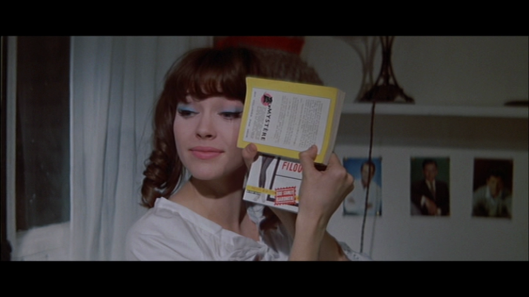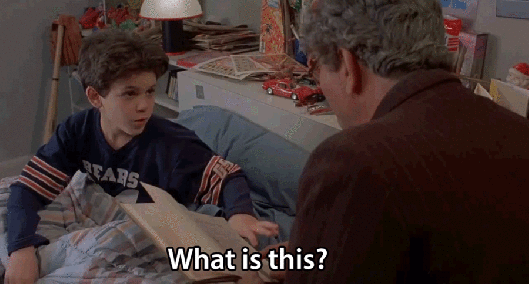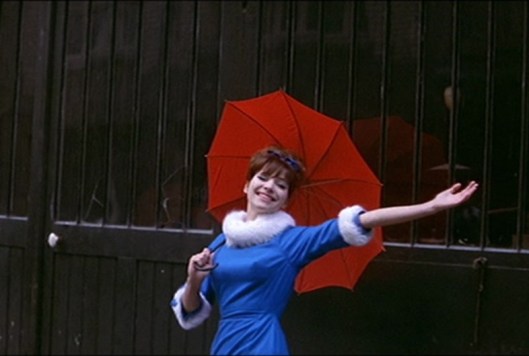Tags
#FranceonFilm, Artaud, Blogathon, Brecht, Classic Cinema, Comedy, Drama, Epic Theatre, Farce, France, Godard, Movies with Cute Clothes, Musical, Neorealism, Romance, Theater of Cruelty
Hello, my darling readers! I hope you all had a fantastic holiday season.
Here we are, January, and with over 50 films covered for my France on Film Blogathon event, my hostess duties will keep me busy January 8-9, so I am posting my submissions early!
Please be sure to visit my blog January 8th and 9th when the party officially commences!
Since we’re discussing French cinema for Day One: I selected Jean-Luc Godard’s Une Femme est Une Femme, because the film exemplifies everything I think of when I think of a French romance.
Let’s face it, France has a bit of a reputation for having a less rigid definition of a relationship. In the Mexican film La Nave de Los Monstruos, two women were interested in the same man, and his response? “We’re not French”. In The Women when Meg Ryan accepts her husband’s philandering ways Annette Bening asks, “since when are you French?”
Films like Belle de Jour reinforce the American mindset that French people have a relaxed attitude toward a committed relationship. Une Femme est Une Femme stars the charming and lovely Anna Karina, the epitome of French femininity. Directed by her husband Jean-Luc Godard, the film mirrors his attempt to define his wife. In the overall scope of Godard’s films, Une Femme est Une Femme (A Woman is a Woman) rarely receives the academic attention given to his other films. It seems to lack the cinematic importance of his later works, having no groundbreaking photography, only slightly experimental imagery, and a very simple plot.
In the overall scope of Godard’s films, Une Femme est Une Femme (A Woman is a Woman) rarely receives the academic attention given to his other films. It seems to lack the cinematic importance of his later works, having no groundbreaking photography, only slightly experimental imagery, and a very simple plot.
Une Femme est Une Femme is often described as “Godard’s salute to the American musical”. The plot follows Angéla (Anna Karina), a stripper who wants “to be in a musical comedy with Cyd Charisse and Gene Kelly”(don’t we all?). Angéla wants a baby, but her boyfriend Émile (Jean-Claude Brialy) does not. He pushes her toward his best friend Alfred (Jean-Paul Belmondo) who is willing to assist Angéla.

I selected this film because it is an ideal film for newcomers to Godard. It is a genre film a musical comedy, its format is familiar, yet it is a Godard film, therefore, an unusual musical. When we watch genre films like musicals, westerns, and film noir, we watch with an expectation of plotlines and outcomes.
But, what happens when that doesn’t happen?
American audiences have a long rich love affair with France. Films like Funny Face and An American in Paris reinforce the idea in the American psyche that France is a quaint, charming country, it’s Disneyland for the romantics.
In Une Femme est Une Femme, France is neither romantic nor ideal. Godard never shows the Eiffel Tower, the Champs-Élysées, or the Seine.
The streets are gray, dreary, and strewn with trash and rubble. This is “authentic Paris” because Une Femme est Une Femme is a neorealist musical. We see Paris through Godard’s eyes, not the lens of an American musical, this is not “La Vie en Rose”.
Then the musical gets interesting because it is not a musical in the traditional sense, there are no musical numbers, per se. In a traditional musical, the scene’s climax is told in song, but that does not happen. Do not misunderstand my meaning, it is not like watching Pygmalion when we are used to My Fair Lady. There it is no dialogue in lieu of a musical moment.
There are moments no one would expect in a musical. For example, as Angéla down the street an ideal moment for a solo number establishing the main character, then the film’s sound cuts out.
Or an argument conducted in complete silence, Angéla and her boyfriend Émile use only book titles to communicate.

Another moment ideal for a charming song and dance duet between Angéla and Alfred becomes a posing contest. No actual dancing.

Her strip routine is the only moment when Angéla sings. The music surges and we expect a musical number, something saucy and Moulin Rouge-esque. Then the music cuts, and the camera pans in for an extreme close-up. We do not see anything other than her face as she sings a capella. Interestingly, her weak singing and fragile performance seem very intimate. Her song feels like an invasion of privacy, revealing much more than had we seen the strip routine.

When filmmakers betray our expectations, we are forced to question the material.

Godard uses the backdrop of Angéla’s baby mania to ask the audience “What is a woman?” The title is a circular statement saying A Woman is a Woman adds no value to the question, and the only answer Godard can give.
Angéla is a stubborn petulant pretty doll, who wants to live in a musical and hates modern women “because they want to be men”. She weeps because she cannot be two images in Chagall painting, she plays with Alfred’s emotions to get to Émile.
In this non-musical musical, while clearly a romance with comedic moments, the actors keep asking, “is this a tragedy or a comedy?” the film is tinged with nostalgia for what cannot be, whether it is the Hollywood vision of France or an ideal romance.
So, what is the point of a musical without musical numbers? Why leave the audience unsatisfied?
Heavily rooted in Brecht’s Epic Theater (which dear reader, you know I love to write about endlessly) and Antonin Artaud’s Theater of Cruelty, Godard’s films purposely distance the audience from the actors. Godard’s films distrust the soporific effects of cinema. The actors break the fourth wall and bow to the audience before they argue. Godard deliberately transgresses the Hollywood tradition, using cinema as a platform for social dialogue.
By not adding the music, he opens a dialogue with the audience he forces us to consider and reconsider the film’s ultimate question, “What is a woman?”
My feminist self would love to have massive issues with Angéla, but I don’t have any issues. Godard does not understand women, but it is not a willful misunderstanding, as a filmmaker, he is trying desperately to understand his wife. He clearly loves her because she is a woman, he just does not know what she is. Angéla is feminine, beautiful, and dressed in bright colors amidst a gray landscape. She is determined and willful. She is an idealized woman.
She is a woman the way Godard sees her: mysterious, illogical, and alluring Une Femme est Une Femme.
Godard does not provide answers, only shows the audience what he sees, and while his lens is idealized, it is not insulting. It is merely a young man’s attempt to define a woman by what he sees.
But for a film that invites much intellectual discourse, it remains a delightfully charming and entertaining film, I highly recommend it.
À bientôt, mes amis, see you January 8 and 9!


Great analysis! I was just thinking about this movie earlier today, oddly enough. It might be my favorite Godard, although it’s hard to pick. I love the way it constantly subverts the audience’s expectations, as you explained so well. Personnel-wise, at least, it’s sort of the ultimate French New Wave movie: Godard, Karina, Belmondo, Brialy, a cameo by Jeanne Moreau (and one by Marie Dubois from Shoot the Piano Player and Jules and Jim), Truffaut references. All it needs is Jean-Pierre Léaud. (And now I want to create some kind of French New Wave bingo game or scorecard. Hmm…)
LikeLiked by 1 person
Hi Erin! Thank you very much, that is a very kind compliment.
It is a lovely little film, and the perfect New Wave roster-primer, you are so right there, and your game sounds like an excellent game.
LikeLiked by 1 person
I really want to watch this now. Although I love music, I’ve never been a real fan of musicals. The song for dialog is just so forced for me. It takes me out of the moment. I know it just reinforces a magical setting for many, many people. It’s me; I know that.
I was especially drawn to the idea of the intimacy created by the “weaker” vocals of Anna Karina in the striptease scene. I immediately thought of Audrey Hepburn’s singing of “Moon River” in Breakfast at Tiffany’s. Her performance was so real, for lack of a better word, I felt that it deepened the connection between her and the audience. Performers bursting into moments of operatic poetry just doesn’t do it for me. I believe I will enjoy Une Femme est Une Femme. (I’m also intrigued by this view of France!)
LikeLiked by 1 person
It is really a fun film, and you are right Karina’s singing is very Hepburn-esque!
I am a musical person myself, but I tend to randomly burst into song or dance, so a number or two is not out of the norm for me. But I know what you mean, sometimes music can detract from the emotional moment.
Being a singer, I normally have massive issues with weak vocals in musicals but since Une Femme is a non-musical Karina’s voice is perfectly authentic, anything better trained would be horrible in that moment.
I hope you get a chance to see it, it is great fun. If you catch it make sure you pop me a line and let me know what you think.
Summer
LikeLiked by 1 person
Exactly the same here. As a singer myself, weaker singers usually elicit an impatient “Get off the screen” from me, but sometimes the song is just so perfect. I did look, and I can rent it from Amazon, so I will definitely be watching.
LikeLike
Pingback: Simone in Pee Wee’s Big Adventure (1985) #FranceOnFilm Blogathon | Serendipitous Anachronisms
Pingback: The France on Film Blogathon is here, FINALLY!!!! | Serendipitous Anachronisms
I’ve read several reviews of this film, but I think yours is my fave. I’ve not seen this film, but I feel your review is good “prep” for this unusual and thought-provoking film. I’m looking forward to seeing it!
LikeLiked by 1 person
That is very kind, thank you! It is a cute movie. I’ll be honest, the concept of a musical without music sounded horrible, so I avoided it for a long time, but it really is a fun unique film. I would love to see a Silver Screenings take on it, it is very post-worthy!
LikeLiked by 1 person
Pingback: Day One #France On Film Recap | Serendipitous Anachronisms
I *think* this is my favourite Godard (it’s so hard to choose!) and that’s because it steps away from the cliched image that movies often have of France and Paris. And it’s refreshing to watch such an inventive take on a musical – not an innovative genre!
Thanks for hosting this blogathon – so many wonderful posts!
LikeLiked by 1 person
Love this! I watched this movie on YouTube and was so charmed by it. I was a little bummed it wasn’t a traditional musical, but I got over it once Belmondo and Karina hit the screen. I think my fave scene is when Karina and her boyfriend get into bed and use book titles to fight. Such a unique idea — and I have a first edition of one of the books they used! (It’s the gray one in the photo you have.) Really interesting post!
LikeLiked by 1 person
I am so glad you saw this film and enjoyed it. Isn’t it great?
I love that argument scene too, particularly the detail of the lamp which must be carried over to the bookshelf. Pure genius.
Thank you so much!
Summer
LikeLike
Wonderful review. Those French films of that era had such a youthful, beautiful aura. As lovely as they are, it almost hurts to watch them.
LikeLiked by 1 person
Thank you very much, you are so right, this is one of my favorite region/era combinations. I could totally live in that world, or at least own everything Anna Karina wears 🙂 in that movie.
-Summer
LikeLike
Thanks again for hosting! Godard always defies expectations, that’s for sure. I like your interpretation that it’s a non-musical musical but still very entertaining. A shame that the Criterion dvd is out of print. Glad to hear it’s at least available on youtube.
LikeLiked by 1 person
Actually, its available through Amazon too 🙂
LikeLike
This was a very interesting reflexion on the film (that I yet have to see). It made me curious about seeing it. Looks quite unusual!
Thanks again for hosting the blogathon
LikeLiked by 1 person
Hi, Virginie! It is a fantastic film, I hope you get a chance to see it, if you catch it, drop me a line, I would love to know what you thought!
And you’re welcome, thank you for participating in the France on Film Blogathon!
Ciao Darling!
Summer
LikeLiked by 1 person
Will there be a repetition of this blogathon? I sure have a couple of entries I would like to contribute too!
LikeLike
This event really warrants a part deux! I will keep you posted.
😊
– Summer
LikeLiked by 1 person